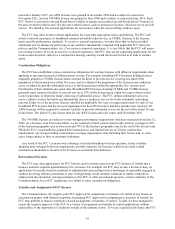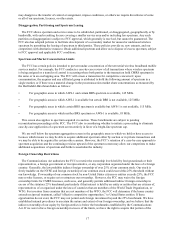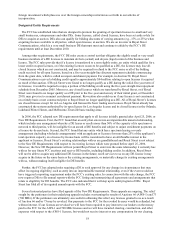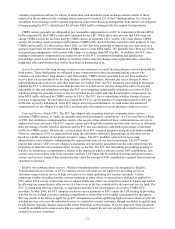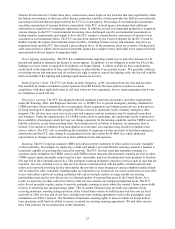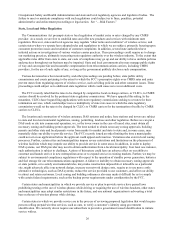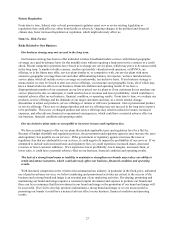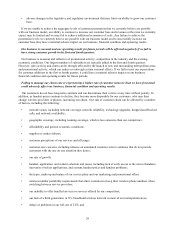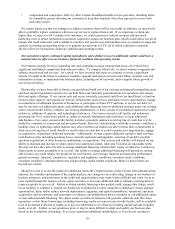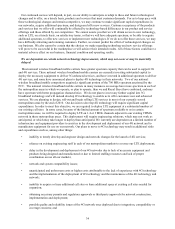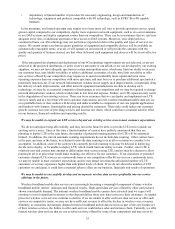Metro PCS 2009 Annual Report Download - page 37
Download and view the complete annual report
Please find page 37 of the 2009 Metro PCS annual report below. You can navigate through the pages in the report by either clicking on the pages listed below, or by using the keyword search tool below to find specific information within the annual report.
25
any action is uncertain. The adoption of such rules for our wireless broadband networks could permit third parties to
run applications on our network that consume large amounts of airtime and/or bandwidth. Our fixed price, unlimited
service is not well-suited to such applications and a mandate of this nature could substantially impede our business.
Network management. In November 2007, a digital content company asked the FCC to prohibit broadband
network operators from blocking, degrading or unreasonably discriminating against lawful Internet applications,
context or technologies. In August 2008, the FCC ruled that Comcast Corporation violated the FCC’s policy
regarding reasonable broadband network management by discriminating against certain types of network traffic.
This ruling currently is on appeal. This ruling’s impact on us, or whether the FCC will initiate similar investigations
against other broadband providers, including wireless providers, is presently unknown.
White spaces. In November 2008, the FCC adopted rules to allow unlicensed radio transmitters to operate in the
unused broadcast digital television spectrum, or White Spaces. The FCC’s rules provide for both fixed and
personal/portable devices to operate in the White Spaces on an unlicensed basis, subject to various protections to
existing users of the spectrum. Policies and industry protocols are in the process of being developed to implement
this program. It is possible that entities may offer services in the White Spaces that could compete with services
offered by us.
Regulatory classifications. In January 2008, the FCC solicited comments on whether text messages and short
codes are common carrier services to which CMRS carriers must provide non-discriminatory access. The outcome
of an FCC ruling or the effect that such a requirement would have on us is presently unknown.
Outage reporting. The FCC and certain states in which we operate require all telecommunications carriers,
including wireless carriers, to report outages meeting certain specified criteria to the FCC and such states. These
reporting requirements affect the way we track and gather data regarding system outages and repair outages, and
potentially subject us to fines and forfeitures if we fail to make timely reports.
Other Federal Regulation
Copyright protection. The Digital Millennium Copyright Act, or DMCA, prohibits the circumvention of
technological measures employed to protect a copyrighted work, or access control. However, under the DMCA, the
Copyright Office of the Library of Congress, or the Copyright Office, has the authority to exempt certain activities
which otherwise might be prohibited by that section for a period of three years, subject to possible extension for
successive three year periods. In November 2006, the Copyright Office granted an exemption to the DMCA to allow
circumvention of software locks and other firmware that enable wireless handsets to connect to a wireless telephone
network when such circumvention is accomplished for the sole purpose of lawfully connecting the wireless handset
to another wireless telephone network. We have implemented a service called MetroFlash that enables new
customers under certain circumstances to unlock their existing CDMA handsets, reprogram them to operate on our
networks, and to connect them to our network. The exemption was renewed in October 2009 until the Copyright
Office resolves whether to grant an additional three year extension. We and others filed comments asking the
Copyright Office to extend this, or a substantially similar exemption, for another three-year period. Other interested
parties, including the principal wireless industry association, or CTIA, have opposed any extension of this
exemption. The outcome of the Copyright Office’s determination is presently unknown.
Economic Stimulus. Congress recently enacted the Recovery Act, which provides, among other things, for an
aggregate appropriation of $7.2 billion to fund grants to provide access to broadband service to consumers residing
in rural, unserved or underserved areas of the United States. The grants are available to, among others, wireless
broadband mobile carriers. Grants of up to 80% of the total cost of the project may be used to fund broadband
infrastructure projects in certain instances. A portion of these funds were made available in 2009 and the remainder
is expected to be made available in 2010. Some of our competitors and new entrants have applied, and we and others
may decide to apply, for the Recovery Act funds. The details regarding the terms and conditions of any such grants
are unsettled and the usefulness of these funds to us is uncertain. If our competitors or new entrants receive grants,
this could allow them to provide service at lower rates, to have lower costs to provide service, or to provide service
in areas that we could not serve economically without support from these grants. If we seek and receive these
grants, we could use these funds to provide service in areas that we traditionally have not served, to reduce our costs
to provide service in certain areas, and to lower our service prices.
Other. Our operations also are subject to various other regulations, including those regulations promulgated by
the Federal Trade Commission, the Federal Aviation Administration, the Environmental Protection Agency, the



